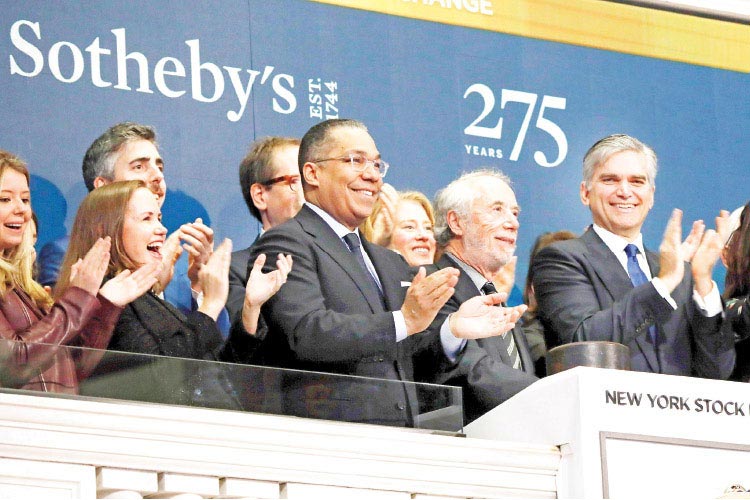Wall Street lifted by tech shares, heavyweight Boeing pares losses

Sotheby’s Chairman Domenico De Sole, 2nd from right, rings the New York Stock Exchange opening bell on Monday. Associated Press
Boeing Co, the best performing Dow component this year by a wide margin, dropped 6.7 per cent after many airlines grounded the company’s new 737 MAX 8 passenger jet.
Helping markets gain ground was the heavyweight Dow component’s stock bouncing off its session lows, while the Dow Jones Airlines index reversed course to trade 0.34 per cent higher.
“Today the big news is Boeing and the rest of the market is bouncing off the five straight down days we had last week,” said Keith Gangl, chartered financial analyst and portfolio manager at Gradient Investments in Arden Hills, Minnesota.
“The markets have been really strong this year and people are expecting that to continue throughout 2019.” The S&P 500 index fell 2.2 per cent last week, its biggest decline since Wall Street tumbled at the end of 2018, weighed by fears of a slowing economy after data showed US job growth almost stalled in February, China’s exports fell and as the European Central Bank slashed growth forecasts for the region.
Still, the benchmark index is now about 6 per cent away from its record high hit on Sept. 20.
All the major S&P sectors were trading higher, led by gains in the high-growth technology sector, which was up 1.81 per cent. Apple Inc rose 3.1 per cent and was the biggest boost to the benchmark S&P 500 and Nasdaq indexes after Bank of America Merrill Lynch upgraded the iPhone maker’s shares to “buy” from “neutral”.
Other marquee names also gained - Microsoft Corp, Facebook Inc and Amazon.com Inc gained between 1.2 per cent and 2.3 per cent.
Instinet upgraded social media giant Facebook to “buy” from “neutral”.
At 11:10am the Dow Jones Industrial Average was up 112.41 points, or 0.44 per cent, at 25,562.65, the S&P 500 was up 29.18 points, or 1.06 per cent, at 2,772.25 and the Nasdaq Composite was up 109.13 points, or 1.47 per cent, at 7,517.27.
Advancing issues outnumbered decliners for a 2.81-to-1 ratio on the NYSE and a 2.62-to-1 ratio on the Nasdaq.
The S&P index recorded 19 new 52-week highs and one new low, while the Nasdaq recorded 36 new highs and 22 new lows.
Meanwhile, oil prices rose 1 per cent on Monday, lifted by comments from Saudi Energy Minister Khalid Al Falih that an end to Opec-led supply cuts was unlikely before June.
Brent crude futures were up 65 cents, or 1 per cent, to $66.39 a barrel by 10:56am.
US West Texas Intermediate (WTI) crude futures rose 52 cents, or 0.9 per cent, to $56.59 a barrel.
Falih told Reuters on Sunday it would be too early to change a production curb pact agreed by the Organization of the Petroleum Exporting Countries and allies including Russia before the group’s meeting in June.
“We will see what happens by April, if there is any unforeseen disruption somewhere else, but barring this I think we will just be kicking the can forward,” Falih said.
Oil markets have been supported this year by the ongoing supply cuts by the group called OPEC+, which has pledged to cut 1.2 million barrels per day (bpd) in crude supply since the start of the year to prop up prices.
The group will meet on April 17-18, with another gathering scheduled for June 25-26, to discuss supply policy.
Falih’s comments “show more than anything that Saudi Arabia and the Opec group is serious about tightening up this oil market,” said Phil Flynn, analyst at Price Futures Group in Chicago.
Gold fell on Monday, moving further away from the key $1,300 mark it briefly surpassed in the last session, as equities steadied following last week’s slide, with stronger-than-expected US retail sales allaying some fears of an economic slowdown.
Spot gold was down 0.4 percent at $1,293.26 per ounce at 11:35am, while US gold futures slipped 0.5 percent to $1,293.30. Spot prices hit $1,300.61 on Friday, but quickly slipped back below $1,300 an ounce.
“Retail sales were better, which means the economy isn’t necessarily slowing as quickly as some have suggested,” said Bart Melek, head of commodity strategies at TD Securities in Toronto.
US retail sales rose 0.2 in January, surprising economists who expected it to remain unchanged.
The strong data could prompt a less dovish stance from the US Federal Reserve, Melek added.
On Sunday, Fed Chairman Jerome Powell emphasized he would be closely monitoring how a slowing global economy affects local conditions in the United States in order to decide the future of its interest rate trajectory.
Higher interest rates reduce investor interest in non-yielding bullion.
Indicating improved appetite for riskier assets, global Stocks regained some ground after its worst week in the year fuelled by a darkening economic outlook, as China promised further stimulus to cure their ailing economy.
“For the most part, investors are still most interested in the equity markets and are not finding a need for any safe haven products at this time,” Walter Pehowich, executive vice president of investment services at Dillon Gage Metals said in a note.
Agencies



